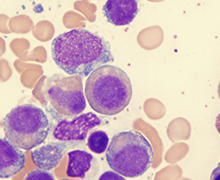Target Audience
The educational design of this activity addresses the needs of oncologists, hematologists, hematology-oncology fellows, as well as other allied health care professionals (HCPs) involved in the treatment of myelodysplastic syndrome (MDS).
Program Overview
Myelodysplastic syndromes (MDSs) are among the most common hematologic malignancies and are characterized by their risk of progression to acute leukemia. Although patients with lower-risk MDS (LR-MDS) have longer life expectancies compared to those with high-risk disease, their disease course is not without challenges. In fact, symptoms related to anemia are very common in this population and lead to poor quality of life. Fortunately, therapies are now available to treat the anemia associated with LR-MDS and improve outcomes across the spectrum of patient and disease profiles. In this Phone-a-Friend series, expert faculty will discuss the management of anemia in 4 different real-life clinical scenarios representative of the heterogeneous spectrum of LR-MDS.
Educational Objectives
After completing this activity, the participant should be better able to:
- Describe the criteria for MDS diagnosis, classification, and risk stratification and how they impact prognosis and therapeutic decision-making
-
Examine the available therapies for treatment of anemia in LR-MDS including the mechanisms of action, indications, dosing and titration recommendations, published efficacy data, and potential treatment-related adverse events
- Develop individualized treatment regimens based on patient- and disease-specific factors to reduce transfusion burden in LR-MDS and improve patient survival and quality of life outcomes


Management of newly diagnosed, treatment-naive LR-MDS


Management of erythropoiesis-stimulating agent (ESA)-refractory, LR-MDS with RS


Management of treatment-naïve LR-MDS


Individualized 1L Therapeutic Decision-Making in LR-MDS with Del5Q







